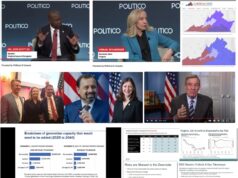See below for video of the unveiling a bit earlier today, by Sen. Jennifer McClellan (patron in the Senate), Del. Rip Sullivan (patron in the House) and Del. Jennifer Carroll Foy (chief co-patron in the House) [UPDATE: Del. Alfonso Lopez (chief co-patron in the House) couldn’t make it this morning, but he played a role in developing this legislation the past few months] and – as the Chesapeake Climate Action Network (CCAN) calls it, “a broad and diverse coalition of advocacy groups and business voices to unveil the Virginia Clean Economy Act, a bill that will take historic steps to give Virginia a 100% carbon-free electricity grid and eliminate emissions by Virginia’s utilities by 2050.” Also, see below for a two-page summary of the Virginia Clean Economy Act, plus a few of my thoughts on this.
- First off, there’s definitely good stuff in here that would take us in the right direction. For instance, I love the emphasis on energy efficiency, which of course is the biggest bang for the buck in many ways, particularly in a state like Virginia, where Dominion Energy has designed a system in which the company is rewarded for producing more, more, more…and most definitely NOT being efficient about it. So yes, energy efficiency should be the #1 priority, which it appears to be in this bill.
- It’s fascinating to see such a broad coalition of Virginia environmental groups come together on this, from the more conservative ones (e.g., League of Conservation Voters) to the more aggressive ones (e.g., CCAN) [UPDATE: one major exception to this is Food & Water Watch, which just issued a statement blasting this bill as, among other things, “unambitious and lackluster”]. Of course, with any large coalition, the question is whether getting consensus required watering things down, heading towards a “lowest common denominator” or whatever. Still, it’s good to see a large swath of the Virginia clean energy and environmental communities apparently getting behind a bill that would, ultimately, speed Virginia’s transition to a clean energy economy.
- It’s good to see an emphasis on environmental justice in this bill, including channeling money from RGGI into “energy efficiency for low-income individuals, who tend to bear the heaviest burden in their energy bills…reduc[ing] power bills for homeowners and renters alike in low-income communities.”
- It’s also good overall to see a move to join the Regional Greenhouse Gas Initiative (RGGI), which “provides a critical revenue stream for investment in energy efficiency, which reduces the overalldemand for power, creates jobs, and lowers individual Virginians’ power bills.” HOWEVER, it’s important to point out – as David Roberts of Vox has done – that while RGGI “works quite well,” it “just doesn’t reduce much carbon.” However, as Roberts adds in a more recent article on RGGI, “Power sector emissions are down and the program is operating smoothly. That RGGI accomplished both while imposing no economic sacrifice (the opposite, actually) has to do with the fact that emissions were already on their way down — and that energy-efficiency investments are smart because the savings compound over time. Diverting money from fossil fuels to energy efficiency would produce a net economic benefit for any state, using almost any policy mechanism.”
- On a less positive note, the Renewable Portfolio Standard (RPS) targets – 60% by 2036, including nuclear power, which currently makes up around 28% of Virginia’s power production – are not nearly as ambitious as I would like. This means that by 2036, only around one-third of Virginia’s power production will be made up of true renewables, like solar and wind power. Just based on the increasingly attractive economics and technology of clean energy, it seems to me like Virginia could do a lot better than that by 2036. Still, as an environmental friend of mine pointed out, if we can get a solid framework in place this year, we may be able to accelerate the targets in a few years.
- Also, as an enviro friend of mine pointed out, thanks to our pals at Dominion Energy, we’ve really boxed ourselves in with all those big gas-fired power plants built this year—more than 4,500 MW this decade. If we close those plants before those gas-fired power plants have fully depreciated (and note that they are built to last 30 years), we’re left paying off those stranded costs at the same time we’re investing in new generation. There are ways to deal with that, but basically Dominion has put us in a tough position. Shocker, eh?
- Another marked omission from this Act is any moratorium on new fossil fuel infrastructure – power plants, pipelines, etc. – in Virginia. Now, it’s certainly possible – as an advocate of this Act pointed out to me yesterday – that the 60% carbon-free mandate by 2036 and the 100% carbon-free mandate by 2050 could act as a sort-of de facto moratorium on new fossil fuel projects, given that it will be clear to the State Corporation Commission, investors, etc. that fossil fuels are on the way out in Virginia, and that it makes no sense to build any more. Still…would be nice to see an actual moratorium in here, as in the Green New Deal Virginia, which was introduced on December 9.
- Speaking of the Green New Deal Virginia (GND VA), it calls for 80% clean energy by 2028, compared to 60% clean energy by 2026 in the Virginia Clean Economy Act. The GND VA also has “minimum energy efficiency goals for buildings in Virginia that improves energy efficiency by 2.4% per year starting in 2020 and 36% by 2035.” That’s crucial, both because buildings are a major source of energy consumption and greenhouse gas emissions, plus the fact that new buildings last for decades, so building them right (e.g., highly energy efficient, if not “net zero”) in the first place is really the only way to go. I don’t see any specific mention of buildings in the Virginia Clean Economy Act, although obviously the investments in energy efficiency would heavily impact residential and commercial buildings.
- The GND VA also lays out strong labor protections – “mandatory project labor agreements, prevailing wage guarantees, protecting the right to organize a union, transitional assistance and retirement benefits” – which I don’t see in the Virginia Clean Economy Act.
- I’m also not seeing any discussion of putting some sort of price on greenhouse gas pollution, which seems like something we absolutely need to do. Nor do I see anything about subsidizing rooftop solar installations and other clean energy projects. Why not tap into the power of market economics by putting a price on pollution and using that money to encourage development of clean energy (e.g., by making it very cheap for people to make their homes energy efficient and/or to put solar panels on their roofs)? Seems like a no-brainer to me.
- We also need to address the transportation sector, of course, including electrifying the vehicle fleet (as part of the goal of “electrifying everything“)
- This entire discussion, as one enviro friend of mine pointed out, should not be “stove-piped,” but should address the broader health, environmental, economic, etc. benefits of moving to a 100% clean energy economy. To an extent, this is about “framing” the narrative, but it’s also about getting the policy right, which in turn means defining the problem correctly, and also defining the potential *benefits* correctly.
- From a strategic point of view, it seems to me that there’s an advantage to putting forth a more “moderate” bill, but only if the objective is to get that passed and to use it as a *starting* point, something to *build on* and not an end point by any means. We certainly don’t want to be in the position of starting with something less than what’s needed, then watching as Dominion and its allies (Republicans, Dick Saslaw, etc.) whittle away at key elements of it.
- Speaking of Dominion, there’s nothing specifically in this bill about that company’s corruption, its outsized role in Virginia’s politics and energy sector, etc. And perhaps this bill isn’t the time or place for that. But…we really do need to discuss whether, going forward, it makes sense to continue with a state-regulated monopoly utility, as opposed to opening up Virginia’s power sector to more competition, whether from other companies or from “prosumers” (“Not too long ago, electricity worked as a one-way street—utilities produced energy and people consumed it. Solar energy has changed that model, enabling people who install solar panels on their rooftops to consume the energy generated and sell the rest of it back to utilities. This turns consumers into prosumers—people who both produce and consume energy.”) In general, we need to have a serious discussion about whether it makes any sense, going forward, to continue with power “monopolies that bundle together disparate energy services, despite new technology making it possible, and desirable, to ‘unbundle’ those services.”
- Finally, it’s important to point out that, in large part thanks to Dominion and its bought-and-paid-for political “allies,” Virginia is starting from an abysmally bad position relative to other states when it comes to our energy economy. It’s also worth noting that, while Virginia *does* have significant renewable energy resources – energy efficiency and offshore wind, for instance – we are obviously *not* located in the solar-rich Desert Southwest or the Great Plains (the “Saudi Arabia of Wind”), nor do we have much hydropower, like NY State. Still…no excuses, we can definitely get to 100% clean energy if we put our minds to it and get our act together.
- Bottom line: the “Virginia Clean Economy Act” has positive aspects, but in many ways is a bill that would have been great 5 or 10 years ago. Today, given dramatic advances in clean energy technology and costs, we can go much further/faster than in the past, and we absolutely should do so. Actually, strike the words “should do so” and replace them with “must do so,” given the fact that almost every day, a dire new report comes out about the extreme urgency of dealing with the climate crisis. At this point, after wasting so many years thanks to fossil fuel companies, their bought-and-paid-for political allies, etc., we are really out of time, and certainly don’t have decades (e.g., until 2050) to ditch the fossil fuel addiction that’s rapidly heating up the planet, acidifying the oceans, and driving species – including our own, if we don’t act – to extinction.















![Video: Sen. Mark Warner Says Last Night, “you saw an angry old man [Trump] giving a partisan screech that doesn’t solve anything”](https://bluevirginia.us/wp-content/uploads/2025/12/warner1218-100x75.jpg)